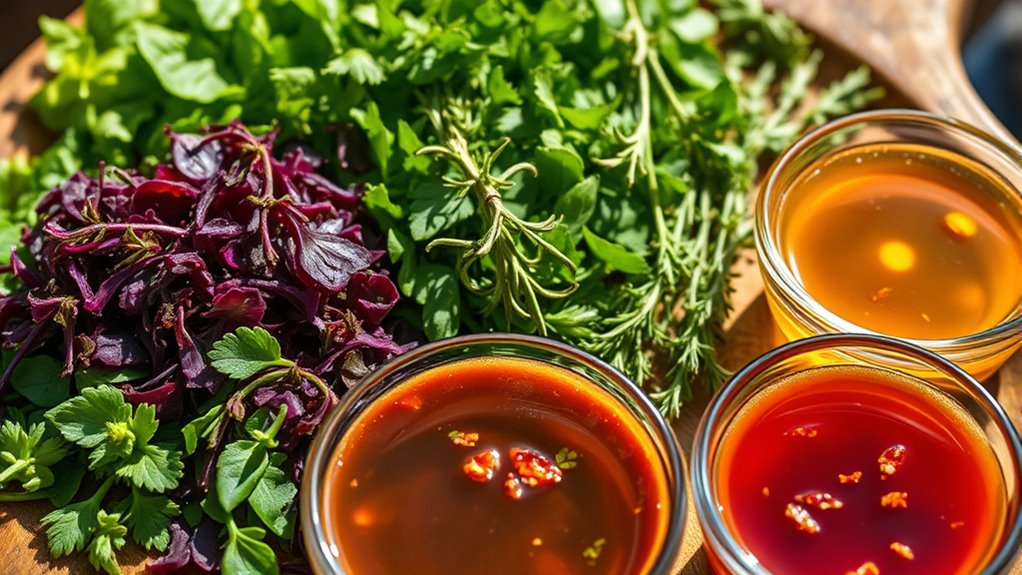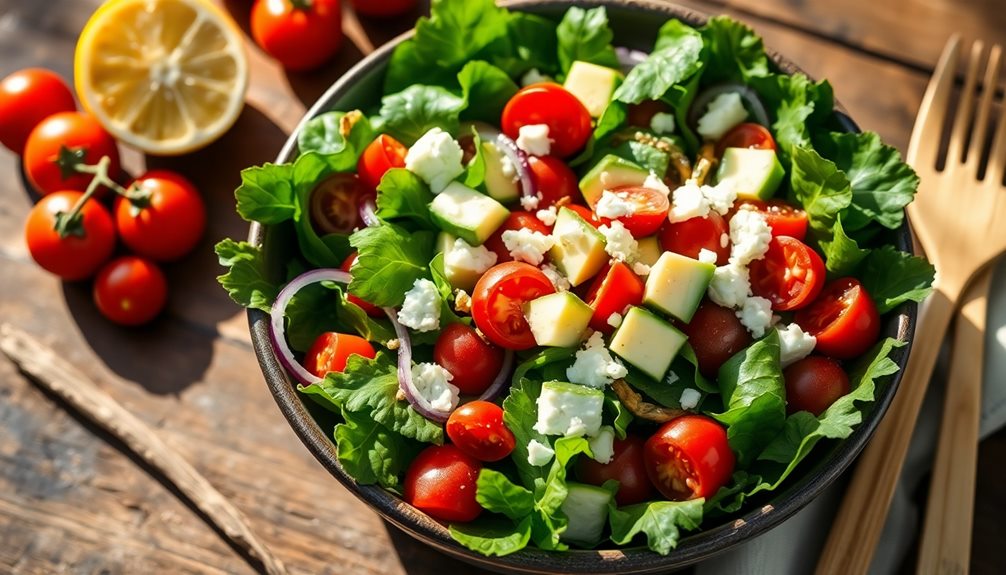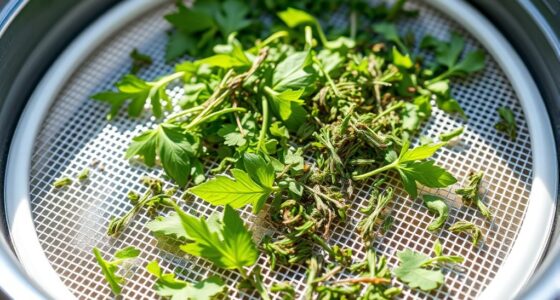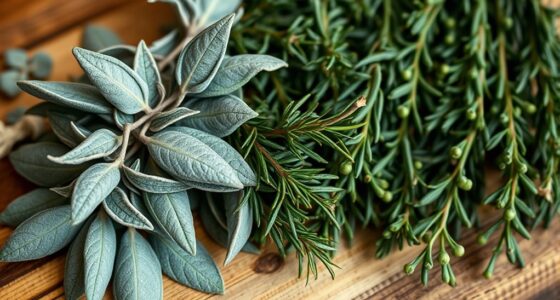Herbal marinades and rubs are excellent ways to naturally boost flavor and tenderize your meats and vegetables. By combining fresh or dried herbs like rosemary, thyme, basil, and oregano with acids such as lemon juice or vinegar, you create vibrant, healthier flavors without artificial additives. Rubbing herbs directly onto your ingredients develops a tasty crust, while soaking in marinades enhances deep, complex tastes. Explore these techniques further to elevate your cooking with natural, customizable seasonings.
Key Takeaways
- Use fresh herbs like basil, rosemary, and thyme in marinades to add vibrant, natural flavors without artificial additives.
- Incorporate acids such as lemon juice, vinegar, or yogurt to tenderize ingredients and enhance herbal notes.
- Apply dry herb rubs with spices like smoked paprika or cumin to create flavorful crusts during cooking.
- Allow meats to marinate or sit with herb rubs for 30 minutes to overnight, maximizing flavor infusion.
- Customize herb blends based on cuisine style or personal taste to naturally elevate dishes with healthy, aromatic flavors.
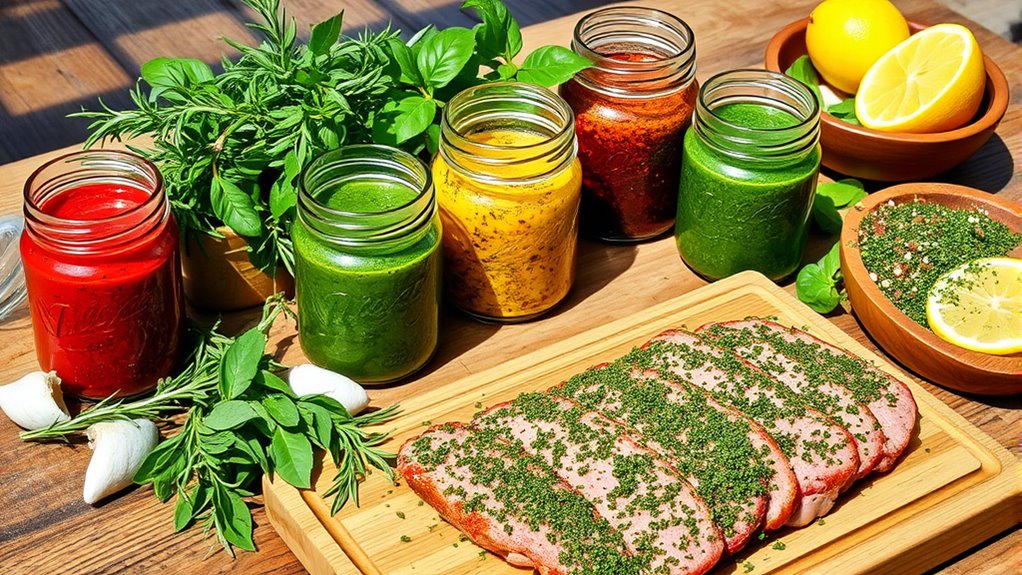
Herbal marinades and rubs are fantastic ways to enhance the flavor of your meats and vegetables. They allow you to elevate your dishes without relying on artificial additives or heavy sauces. When you start experimenting with herbal marinades and rubs, you’re tapping into a world of diverse cooking techniques that *unlock* new layers of taste. These methods involve soaking or coating your ingredients with a blend of herbs, spices, acids, and oils, which work together to tenderize and flavor your food naturally. By understanding the right flavor combinations, you can tailor each dish to your preferences and create memorable meals that impress family and friends alike.
Using marinades is an excellent way to imbue your proteins and produce with complex flavors. The key is to choose herbs that complement your main ingredients. For example, rosemary and thyme pair beautifully with lamb, while basil and oregano work well with chicken or vegetables. Incorporating acids like lemon juice, vinegar, or yogurt helps break down muscle fibers, making your meats more tender while enhancing the herbal notes. When designing your marinade, think about balancing flavors—if you’re adding a touch of sweetness with honey or maple syrup, offset it with a splash of tangy vinegar or citrus to keep the profile lively. This approach to flavor combinations ensures your dishes are well-rounded and vibrant.
Choose herbs like rosemary and thyme for lamb, basil and oregano for chicken, and balance flavors with acids for vibrant, tender dishes.
Rubs, on the other hand, are dry blends of herbs and spices that you apply directly onto the surface of your meat or vegetables before cooking. They create a delicious crust and intensify the natural flavors during grilling, roasting, or pan-searing. To develop a good herbal rub, combine dried herbs like sage, oregano, or parsley with garlic powder, onion powder, salt, and pepper. You can also experiment with other seasonings like smoked paprika or cumin for more depth. When applying a rub, make sure to massage it evenly into the surface, allowing the herbs to penetrate slightly and form a flavorful barrier. Letting the rubbed meat sit for at least 30 minutes or overnight helps the flavors meld and deepen.
Both cooking techniques—marinating and rubbing—give you control over your flavor profile. They allow for endless flavor combinations, whether you prefer fresh, zesty, or earthy notes. The beauty lies in the versatility: you can switch herbs based on the season, the cuisine style, or your mood. Incorporating fresh herbs like cilantro and dill adds brightness, while dried herbs contribute concentrated, robust flavors. By mastering these herbal techniques, you not only boost the natural taste of your ingredients but also enjoy the process of customizing each dish to suit your palate. Ultimately, herbal marinades and rubs are simple, effective ways to make your cooking healthier, more flavorful, and uniquely yours.
Frequently Asked Questions
Can Herbal Marinades Replace Traditional Chemical-Based Flavor Enhancers?
Herbal marinades can definitely replace traditional chemical-based flavor enhancers. They add natural flavor and often bring health benefits, such as antioxidants and anti-inflammatory properties. By using herbs, you enhance your dishes without artificial additives, making your meals healthier and more flavorful. Plus, herbs can deepen the aroma and taste naturally, giving your cooking a fresh, vibrant touch that chemical enhancers can’t match.
Are Herbal Rubs Suitable for All Types of Dietary Restrictions?
Herbal rubs are like a versatile garden—able to adapt to your needs. They’re suitable for many dietary restrictions, offering gluten-free options and vegan adaptations, so everyone can enjoy their natural flavors. Check ingredients carefully, especially for hidden additives, but generally, herbal rubs fit well within a variety of diets. They’re a natural, flavorful choice that respects your lifestyle while enriching your meals.
How Long Can Herbal Marinades Be Stored Safely?
Herbal marinades can typically be stored safely for up to 5 days in the refrigerator. After this storage duration, the spoilage risk increases, so you should discard any marinades that develop an off smell or change in appearance. To minimize spoilage risk, keep your herbal marinades in airtight containers and always label them with the date you made them. This way, you can enjoy fresh, flavorful marinades without worry.
Do Herbal Rubs Work Equally Well on All Meats and Vegetables?
You’ll find herbal rubs work best when tailored to specific meats or vegetables. For example, a rosemary-garlic rub enhances lamb’s richness, while a basil and oregano blend complements tomatoes or zucchini. Using meat-specific techniques, like longer rests for tougher cuts, maximizes flavor absorption. Vegetables with milder flavor profiles absorb herbs quickly, but stronger herbs may overpower delicate produce. Adjust your rubs accordingly to achieve *best* flavor on each ingredient.
Can I Customize Herbal Marinades for Specific Health Benefits?
Yes, you can customize herbal marinades for specific health benefits by choosing herbs with targeted properties. For personalized health, select ingredients like turmeric for inflammation, basil for digestion, or rosemary for antioxidants. Combining herbs creates herbal synergy, enhancing their effects. Adjust flavors and herbs based on your health goals, and experiment to find the perfect blend that supports your well-being while adding delicious flavor to your meals.
Conclusion
Now that you know how to craft herbal marinades and rubs, imagine the incredible flavors waiting to transform your next meal. But don’t stop here—there’s a world of fresh herbs and secret ingredients just waiting to elevate your culinary game even further. Ready to experiment and uncover your signature blend? The best part is, the more you explore, the more delicious surprises you’ll discover. Are you prepared to unleash the full potential of your kitchen?
